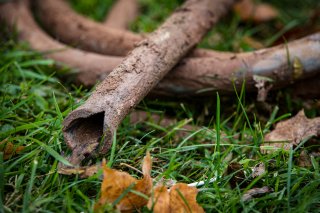Lead Service Line Inventory Guidance Webinar
- Watch the webinar recording (February 27, 2024)
- Small Drinking Water Systems Webinar Series
About the Webinar

1. EPA Lead Service Line Inventory Guidance
Developing a lead service line (LSL) inventory and identifying the location of LSLs is the first step for beginning LSL replacement and protecting public health. The purpose of this presentation is to walk through the EPA’s Guidance for Developing and Maintaining a Lead Service Line Inventory. The guidance provides support for the service line inventory requirements according to the 2021 Lead & Copper Rule Revisions, referred to as LCRR.
Presenters:
Melanie Bolden, EPA's Office of Water. Melanie is a biologist in EPA’s Office of Ground Water and Drinking Water where she works on the implementation of the Lead and Copper Rule. She holds an MPH from SUNY- Albany, a B.S. in biology from the University of Arkansas. Melanie is also currently a doctoral student in environmental health at Johns Hopkins University’s Bloomberg School of Public Health.
Holly Young, EPA's Office of Water. Holly is a physical scientist in EPA’s Office of Ground Water and Drinking Water where she works the on implementation of the Lead and Copper Rule. She holds an M.S. in geography from Virginia Tech, and a B.S. in geology and an MBA from the University of Kentucky.
2. Colorado Lead Service Line Inventory Guidance
This presentation covers Colorado’s initial service line inventory guidance policy, which builds on EPA’s LSL inventories guidance document. Colorado water systems requested a policy to formalize requirements and expectations related to issues such as calling galvanized lines non-lead, statistical modeling, and non-lead cutoff dates. Colorado discusses some of state specific policy decisions on the initial service line inventory and potential Lead and Copper Rule Improvements impacts.
Presenters:
Melanie Criswell, Colorado Department of Public Health and Environment. Melanie is a Lead Service Line, Corrosion, and Emerging Contaminants Engineer at the Colorado Department of Public Health and Environment, Water Quality Control Division. She has 20 years of experience working in the water and wastewater industry. Melanie has an M.S. in civil-environmental engineering from Colorado State University and a B.S. from the University of Colorado Boulder.
Haley Orahood, Colorado Department of Public Health and Environment. Haley Orahood has worked for the Water Quality Control Division for 8 years, initially as a drinking water compliance specialist, and more recently as a regulatory development and implementation specialist. Her work over the last year and a half has focused largely on adopting the federal Lead and Copper Rule Revisions in Colorado and developing resources to help water systems comply with the new requirements.
Chad Seidel, Ph.D., P.E., Corona Environmental Consulting, LLC. Chad is the president of Corona Environmental Consulting and a research affiliate at the University of Colorado Boulder. He has devoted his career to researching and improving how drinking water is regulated and implemented―including DBPs, arsenic, nitrate, lead, PFAS, and more. He and his team have addressed wildfire concerns for water systems across the country and recently lead the recovery response for the City of Louisville and Town of Superior following the 2021 Marshall Fire in Colorado. Chad holds a Ph.D. in environmental engineering from the University of Colorado Boulder and is a registered engineer in several states.
